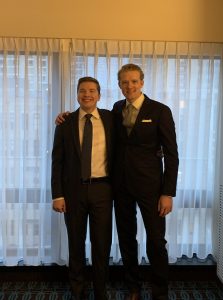Two brothers, Brendan and Philip Anderson, are experiencing relief after adopting tinted contact lenses prescribed by Sanbrita Mondal, OD, clinical adjunct assistant professor and director of the UW Health Low Vision Services.
Brendan, 26, and Philip, 21, both showed signs of nystagmus (involuntary and repetitive eye movements) and light sensitivity after birth. In both cases, a neurologist ultimately referred the family to an ophthalmologist in the Cleveland, Ohio, area where the family lived at the time. The condition was first diagnosed as cone dystrophy, a group of inherited eye disorders that affect the light-sensitive cells of the retina1. The disorder was later characterized as achromatopsia. Achromatopsia is a rare inherited retinal degeneration, sometimes called day blindness due to the extreme light sensitivity. Reduced visual acuity and color discrimination are also hallmarks of the condition2.
Growing up, it was the light sensitivity that posed the greatest challenge for the brothers each day as it impacted the sharpness of their vision to the point that it made it much more challenging to see, read or complete daily tasks. With the aid of dark tinted lenses, Brendan and Philip were able to navigate both indoor and outdoor environments so that they could live well-rounded lives. They grew to love theatre and sports, including skiing and running, activities that they continue to enjoy.
After moving to the Madison area in 2004, the Andersons made an appointment with the UW Health Inherited Retinal Degenerations Clinic. They were subsequently referred to the UW Health Low Vision Clinic. At the first appointment, Dr. Mondal listened carefully to Brendan and Philip as they described their day-to-day vision needs.
“Dr. Mondal takes a caring, problem-solving approach as she clearly strives to help her patients achieve all the function possible from their eyes,” said Laura Anderson, Brendan and Philip’s mother.
The idea of trying tinted contacts was new to Brendan and Philip. They were both thrilled with the prospect of being able to use them, especially in very bright light situations such as a snowy sunny day, when sunglasses alone fell short.
Brendan and Philip felt tremendous relief as they tested the contacts in various kinds of lighting. They were happy to find that they might be able to function without sunglasses on occasion, which takes a weight off the face and allows for more enjoyable experiences and personal interactions. They began to dream that activities like job searching may be significantly easier as they might be able to avoid the reason-for-sunglasses discussion.

“I am looking forward to using the tinted contacts, particularly in situations where I am meeting new people,” Brendan noted, “which would ordinarily require an explanation for why I am wearing sunglasses!”
“When I stepped outside to go cross country skiing, the tinted lenses made all the difference in the world,” Philip recalled. “For the first time in that type of bright light, I felt confident in navigating my way.”
The UW Health Low Vision Clinic procures tinted lenses from Adventures in Color, a company based in Golden, Colorado, that specializes in prosthetic and special effect lenses. The achromatic lenses are soft contact lenses in custom filter colors that provide excellent comfort and allow customization to suit the light sensitivity need of each patient.
“Tinted contact lens IS one of the options we have in our low vision toolbox to help patients with visual comfort and functions under various lighting situations. It is heartwarming to see our efforts can impact lives on a such personal level,” -Dr. SANBRITA Mondal.
More information the UW Health Low Vision Clinic can be found here.
1 https://rarediseases.info.nih.gov/diseases/10790/cone-rod-dystrophy